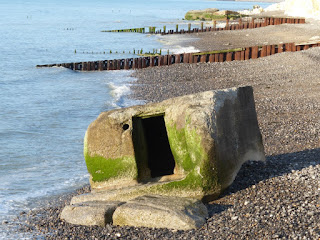Dieppe is a famous, or infamous place, in WWII history. Lord Louis Mountbatten's Combined Operations were doing raids all the way from Norway to France in 1941-42. The British had little else to cheer about. Stalin was demanding a second front. Churchill was in Moscow trying to avert a separate peace between Russia and Germany (as if...). And on August 19, 1942, a force of some 5,000 thousand Canadians, 1,000 British, and 50 American Rangers, attacked the fortified harbor of Dieppe. (Previous raids had involved scores or hundreds, not thousands). The reasons given for the "raid" were numerous: to test new amphibious methods and equipment, to see how strongly the Germans would defend Dieppe, to see whether the harbor could be held for "two tides," to see whether a fortified harbor could be taken without bombardment, to give the Canadians some battle experience (ancestors from Dieppe had settled in Canada 300 years before), to impress or appease Stalin, to divert more German divisions back to the west, to boost British morale, etc. There is even a theory that the raid was simply a diversion to allow theft of the latest German Engima (code) machine from German naval headquarters at Dieppe...this associated with the writer Ian Fleming who was in British intelligence during the war. The raid was a disaster. 68% of the Canadians were killed, wounded, or captured. None of its putative goals were met. Yet, in 1944, Mountbatten would claim, echoed by Churchill and Montgomery, that the success of Normandy was due in large measure to the sacrifice at Dieppe, and what was learned there. Anyhow, I've always been interested in the Dieppe matter...partly my twentieth century history avocation plus the suspicion that much can be learned about committee decision-making from Dieppe. Some claim the raid was in fact never officially approved, but merely proceeded up various meeting agendas with no strong opposition; and then Churchill's mission to Moscow. Who was going to take on the King's First Minister or a royal (Mountbatten) who had happened onto a career in the navy?
 |
There is a large, fine aire de camping-cars right on the harbor
in Dieppe; but it was "sature"; we figured out why the next day |
 |
| So I contented myself with a look around the harbor |
 |
And some pix; and we drove on 20 miles inland to another site
(next post) |
 |
The next morning, back on course toward the coast, we came
upon the Canadian cemetery at Dieppe |
 |
| Thus |
 |
| And thus |
 |
| Part of the cemetery |
 |
As it happened (the Tour de France got in our way), we got to
Pourville sur la Mer only that evening; Pourville was one of
the flanking landing beaches, the only one where the commandos
(including the Rangers) got in, did their job, and got out |
 |
| The Canadian memorial at Pourville |









1 comment:
Interesting.
Post a Comment